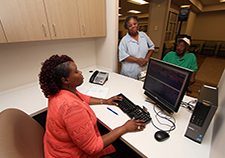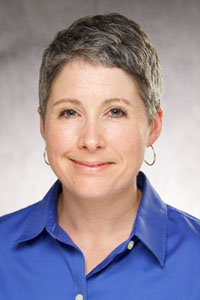Office of Research & Development |
 |

VA Research Currents archive
September 13, 2016

Lenarda Barksdale, a PACT clerk at the Baltimore VA Medical Center, helps Vietnam Army Veteran Jadie Sinclair with an appointment. Sinclair is accompanied by his daughter, Janice Quintana. (Photo by Mitch Mirkin)
Anthropologists aren't always exploring exotic cultures in far-off lands. Often, they can be found in far more familiar settings—like VA medical centers.
In fact, a few dozen anthropologists work in VA. They are a small community of social scientists within the larger VA research enterprise, which includes some 3,000 investigators. But as experts who study culture, they provide powerful insights into how care is delivered, and how it can be improved.
For instance, an anthropologist-led team at the Iowa VA Health Care System has been studying VA Patient Aligned Care Teams—the new model of primary care that VA put in place nationwide starting in 2010, based on the medical home concept.
The transition has gone well overall, as documented in numerous studies by VA researchers. But VA is still looking to refine the model.
Two recent publications from the Iowa researchers, led by medical anthropologist Dr. Samantha Solimeo, homed in on an aspect of PACTs that otherwise has received little attention: the role of clerical or administrative associates, or clerks.
"The VA PACT implementation is likely the largest and most complex and comprehensive iteration of the patient-centered medical home anywhere in the world. "
One of the articles went online Feb. 8, 2016, in the Medical Anthropology Quarterly. The other appeared in the July 2016 Annals of Family Medicine.
A central theme in the work: Clerks tend to be undervalued, their role underappreciated.
Call them the Rodney Dangerfields of primary care: One can imagine a collective "We don't get no respect" emanating from the ranks of these PACT staffers, the only members of their four-person teams who are not licensed to provide health care per se. Typically, the other staffers in a PACT include a primary care clinician, who is usually a physician, physician's assistant, or nurse practitioner; a registered nurse; and a clinical associate, usually a licensed practical nurse.
Clerks' duties, for the most part, include scheduling, greeting patients, verifying their information in the electronic health record, and answering and routing phone calls.
But along with this, according to Solimeo and her team, PACT clerks do in fact provide care, of a sort. They do so through a type of "emotional labor"—their everyday interactions with patients, in which the attention, empathy, and support they offer can be a vital component of patients' overall experience.
Consider this quote from a clerk interviewed by Solimeo's team:

Dr. Samantha Solimeo, a medical anthropologist, has led studies of VA's Patient-Aligned Care Teams.
"I have so many patients that are just so grateful for just that little bit that you do for them....Telling them what their future appointments are and 'Hey, maybe we can put these appointments together. Do you want to do that? ' And just knowing that before I even call patients back, how far away they live, whether they're diabetic or not so we know how early or late we can do the labs, and if there's any other appointments that need to be scheduled. I go through the trouble of displaying clinic availability in other clinics even though I can't schedule for them, so at least I can try to find something that will work for all of them."
Such activities are of no small consequence, maintains Solimeo and her colleagues. Rather, they are integral to the health care Veterans receive.
This expert view is by no means conventional. Clerks, if anything, have been considered gatekeepers, managing patients' access to care in some ways, rather than providers of care. Solimeo believes it is not a stretch to consider clerks as providers, along with nurses and doctors, notwithstanding their non-licensed status.
To the extent primary-care teams adopt this view, she says, they can promote higher job satisfaction for clerks, and improved performance by their whole group, which means better outcomes for Veteran patients.
VA Research Currents spoke with Solimeo to learn more about her team's findings, and their implications for VA and Veterans.
Your group has studied several aspects of PACTs. What is the overall purpose of the research?
The VA PACT implementation is likely the largest and most complex and comprehensive iteration of the patient-centered medical home anywhere in the world. In that sense we are a living laboratory of the model's potential success and unintentional consequences. Recognizing this potential, the VA Office of Patient Care Services has supported the VISN 23 [Midwest region] PACT Demonstration Lab to examine the implementation process and its outcomes so that we might capitalize on where we excel and identify where we are coming up short.
Your latest research suggest that PACT clerks tend to feel under-valued, and that this feeling is often warranted, based on how other staff relate to them and view their contribution. They sense they are at the lowest rung of the social hierarchy within the PACT, and may even feel alienated from the rest of the team. Is that accurate?
I'd agree with this generalization, yet we've also seen evidence that it doesn't have to be this way. We've observed and spoken with clerks who were part of PACTs that work as a team in more than name alone. When you see a well-functioning PACT in action, you see a clerk who is valued for their organizational skills, their knowledge of VA scheduling and policies, and mostly, for their ability to connect with individual Veterans on a first-name basis. It's really this last part—the work that clerks do to coordinate care for each Veteran, to make them feel welcome and valued—that seems to go under-recognized in less close-knit teams.
Tell us more about the role of the clerk in a PACT that functions at the ideal level.
Ideally, all PACT members will huddle daily to troubleshoot potential scheduling or clinical needs and stay in frequent communication with each other throughout the day. Clerks connect each Veteran with the VA staff who can most effectively meet that Veteran's needs. Veterans arriving to the clinic are greeted by someone they know and trust, and before they leave the clinic they meet with that clerk again to make sure that they have all of the information they need for the next steps in their care. Behind the scenes, clerks produce reports on their team's performance, participate in quality-improvement projects, coordinate appointments, and maintain accurate patient records.
Is there anything about the physical layout of PACT clinics that hinders clerks' acceptance as full team members?
The traditional clinic layout, with all of the clerks at a front desk separated from the rest of their team, can really challenge PACTs to stay connected. We've seen individual teams work against this separation by finding huddle times that allow the clerks to participate, by using VA's instant messaging service, or by making sure to include the clerk's name and direct phone line on team information provided to Veterans.
With respect to the way PACT members communicate among themselves, are there factors that subtly downplay clerks' contributions?
We all recognize that our choice of words can have a big impact on how other people perceive their relative value. In the beginning of PACT implementation, phrasing such as "working to the top of your license"was commonplace. This kind of language undermines clerks' contributions to their teams, because they are not clinically licensed personnel. This language also works to make clinical roles more rigid and less reflective of individual providers' expertise. Thoughtful attention to how we talk about sharing the responsibility for patient care is an important part of sustaining teams.
You found that clerks are often excluded from regular team meetings, in part because someone has to staff the reception area while the team meets. Did you find exceptions, where clerks not only attended regularly, but were invited to share their input?
Absolutely! There are PACTs that schedule their meetings at times when the clerks can attend, and that have clerks participate in discussions beyond simply taking meeting notes and reserving a space. Some PACTs even rotate team leadership roles.
What lessons from your research can be applied by VA and its PACT community?
To maximize PACT clerks' contributions to Veteran care, we need to invest in them as professionals. This encompasses everything from assuring that the PACT is fully staffed, to evaluating PACT performance in terms of the entire team's labor, to providing professional development opportunities for clerks to enhance their coordination and patient-centered care skills, to regarding them as skilled health care workers with an important role in Veteran care. Investing in clerical staff means enhancing the quality of Veterans' first interaction with their health care system and sustaining long-term relationships between Veterans and their care providers.